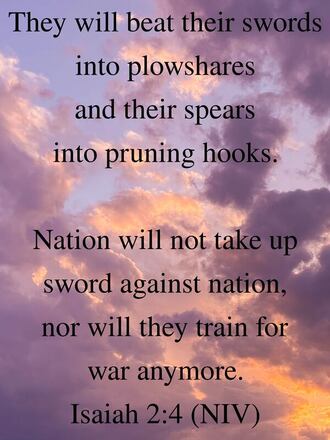 There are many fathers in the Bible, but very few moments of fatherhood. David has many kids, though he allows his family to fall into disarray and fratricide (2 Sam. 13-18). Abraham almost sacrifices Isaac (Gen. 22:1-19) and abandons Ishmael (Gen. 21:8-21). Joseph is a protective father to Jesus, but he prematurely disappears (Mat. 1:18-25; Luke 2:41-52). But there is one father who appears as a fairly regular presence over a long period and overall is a good dad: Laban. In case you forgot about him, Laban is the brother of Rebekah, who married Isaac (Gen. 24:29). He is the father of Leah and Rachel (Gen. 29:16). Now, he isn’t an upstanding person for most of the story. He tricks Jacob into marrying Leah after promising Rachel and forces him to work an extra seven years, 14 in total (Gen. 29:25-30). He attempts to keep Jacob and his family close to profit from them (Gen. 30:27). When they do flee, he chases them down and is kept from doing something violent thanks to God’s intervention (Gen. 31:22-24). But let’s turn the story around and see things from Laban’s side. He invites in his nephew, who is on the run from an abusive situation at home (Gen. 27:41-45). When he learns that Jacob is in love with his daughter, he sets forth a task to test Jacob’s resolve and work ethic. After all, he doesn’t really know anything about this young man (Gen. 29:15-20). When Jacob passes the test with flying colors, Laban decides to trick him into marrying Leah. Perhaps he saw Jacob’s success and knew he would be a good caretaker for both daughters and that keeping him close would be helpful to the entire tribe (Gen. 29:21-28). When Jacob wants to return to his parents, Laban attempts to set a fair price for Jacob’s work that will keep him around for some time yet, giving Laban more time with his daughters and grandchildren (Gen. 30:25-34). He doesn’t become upset until Jacob tricks him in the payment of his wages and then runs away with his family and Laban’s gods (Gen. 31:1-21). (Jacob didn’t know Rachel stole the gods.) Laban chases them in anger for a week until God warns him not to resort to violence (Gen. 31:22-24). Still angry, Laban confronts Jacob. After a series of conversations and his failure to find the gods (Rachel was tricky too), Laban and Jacob come to an understanding (Gen. 31:25-55). Laban promises to let them go in peace and respect boundaries, and Jacob promises to be a good and protective husband and father. Laban then kisses his daughters and grandchildren and departs (Gen. 31:55). Is Laban perfect? By no means! He is controlling, making decisions based on his own needs and wants, and doesn’t take into consideration others’ opinions. He is untrustworthy and untrusting (those two often go together) and is frightening enough that Jacob feels he needs to flee while Laban is away from camp (Gen. 31:20). However, he is also a good dad who is looking out for the best for his whole family, not favoring one child over another. He has his eye on the future and wants to ensure that his loved ones are cared for even when he can’t. He loves his daughters and his grandchildren and wants the best for them, even if it hurts him. And he gave a down-on-his-luck kid a chance to thrive. Fatherhood is complicated and messy. Dads sometimes make the wrong decisions out of good intentions and acceptable concerns. Laban is a good example of what can go right and wrong. Dads need to learn to balance their instinct to protect with their children’s need to grow. They must not only be approachable when it comes to difficult matters but extend that trust to others. And when that day comes when their children fall in love and leave the nest, they can be present as a friend, advisor, and dad as needed, and a watcher from a distance at other times. A Happy Father’s Day to all dads. May you walk well in the messiness that is fatherhood and be the best dad you can be.
0 Comments
 Tabitha, also known as Dorcas, is a remarkable figure in the Book of Acts (Acts 9:36-43), despite her brief mention in the Bible. Resurrection is indeed rare in biblical accounts, with only a handful of individuals explicitly named. Among them are the children: the widow of Zarephath's son, the Shunammite woman's son, the widow of Nain's son, and Jairus' daughter, all instances born from a parent's profound desire for their child's return. Lazarus, raised by Jesus in John 11, holds a unique position as a friend of Christ. Eutychus, revived by Paul in Acts 20:7-12 after a fateful fall, showcases Paul's compassion even in unintended circumstances. The accidental resurrection of a man upon touching Elisha's bones (2 Kings 13:20-21) stands as an exceptional event, attributed to Elisha's lingering spiritual influence. The enigmatic mention of saints raised in Jerusalem (Matthew 27:50-53) upon Jesus's death adds layers to the miraculous fabric of Scripture. Of course, Jesus's own resurrection remains the pivotal and unparalleled event in Christian theology. Tabitha's resurrection stands out amidst these accounts. She lacked a prominent advocate, had no personal connection with Peter, and her revival wasn't tied to extraordinary events or a prolonged sermon. Tabitha's return to life was a direct result of her esteemed status within her church community. What made Tabitha so beloved? While her background remains largely unknown, her actions spoke volumes. Described as "always doing good and helping the poor," Tabitha's legacy was one of active service and kindness. The widows, recipients of her generosity, displayed the garments she had crafted, a testament to her hands-on approach in aiding her fellow believers. Her death profoundly impacted the Joppa community, prompting them to seek Peter's intervention. The story of Tabitha's resurrection unfolds in Acts 9:36-43. In Joppa (Joffa), a woman named Tabitha, was devoted to good works and acts of charity. She was known for making garments for the widows in the community, providing them with not just warmth but also a sense of dignity and care. Her life exemplified the Christian virtues of compassion, generosity, and service to others. Tragically, Tabitha fell ill and died, leaving behind a grieving community and many widows who had benefited from her kindness. They sent for Peter, urging him to come quickly. Upon Peter's arrival, the room was filled with mourners, especially the widows whom Tabitha had cared for so diligently. They showed Peter the garments and tunics that Tabitha had made for them, a tangible expression of her love and compassion. In the midst of this sorrowful scene, Peter knelt down and prayed. Then, turning to Tabitha's lifeless body, he said, "Tabitha, arise." Miraculously, Tabitha opened her eyes, sat up, and Peter presented her alive to the astonished crowd. This miraculous event had a profound impact on the community. Many believed in the Lord as a result of Tabitha's resurrection, and Peter stayed in Joppa for some time, continuing to minister to the believers there. Tabitha's resurrection isn't a promise for all good-hearted individuals to expect a miraculous return before the End of Days. However, her story offers timeless lessons. Firstly, she embodies Christian service and love in action, emphasizing the significance of using one's talents for others' benefit. Secondly, her revival symbolizes the hope of new life in Christ, showcasing God's transformative grace and the promise of resurrection for believers. Tabitha's narrative challenges us to embrace compassion, generosity, and trust in God's power to bring renewal, even amid life's darkest moments. Her story echoes through generations, inspiring us to live lives of service, kindness, and unwavering faith in God's redemptive plan. Tabitha's story challenges us to live lives of service, kindness, and faithfulness. It reminds us that our actions can have a powerful impact on others and that God is able to do exceedingly abundantly above all that we ask or think (Ephesians 3:20). Since childhood, I've been captivated by the tale of Ehud (Judges 3:12-20). In essence, Ehud, a left-handed Benjaminite, liberated a repentant Israel from Moab's oppressive rule. Tasked with delivering tribute to the portly King Eglon, Ehud seized an opportune moment, claiming a secret message for the king's ears only. The king dismissed the servants, leaving only himself and Ehud in the chamber. Alone, Ehud drew a hidden sword from his right hip and delivered a divine message, “I have a message from God for you,” resulting in a fatal blow.
Eglon's size was such that the entire 18 inches of the blade, along with the handle, penetrated him, leading to an unfortunate outcome. First, he soiled himself, and then his death ensued. Subsequently, Ehud discreetly exited the room, securing it behind him. The unsuspecting servants, assuming the king sought privacy during a moment of relief, patiently waited before unlocking the door, only to discover Eglon's lifeless form. Seizing this interval, Ehud swiftly rallied Israel and orchestrated an offensive against Moab, breaking free from their oppressive rule. Ehud's strategic actions resulted in 80 years of peace for Israel, marking a triumphant chapter in their history and the longest peaceful period in Judges. As a child, I loved this story for its action-packed heroics, vivid imagery, and a touch of potty humor – elements that resonated with my nine-year-old self. However, as an adult, I began to grasp the deeper meaning of this story. Ehud's left-handedness and Benjaminite origin marked him as seemingly weak and unremarkable. Yet, he turned these perceived weaknesses into strengths. Ehud's apparent vulnerability and unconventional hiding place for his sword allowed him to get close to the king, showcasing his cunning nature. He used his weaknesses to his advantage, creating an opportunity for Israel to triumph over Moab's oppression. Yes, Ehud’s story is a bloody one, but that is not what we celebrate. The narrative’s importance is the conviction that weaknesses, so often concealed for shame, can be transformed into strengths. We tend to believe that weaknesses should be hidden, but Ehud's story challenges this notion. God called on Moses, a stutterer, to speak, emphasizing the importance of deliberate speech. Similarly, those who have experienced loss often attempt to minimize their emotions, believing that their sadness is a burden to others. Yet when they lean into their experience, they are often able to connect most profoundly with those undergoing present suffering and offer hope and comfort. While I can't claim to know how your specific weakness contributes to the Kingdom of Heaven, I encourage you to reflect on your vulnerabilities this week and consider how God may call on you to use them. How might they assist in your Christian journey and the work of the Kingdom?  We have been studying Isaiah in our Tuesday Night Bible Study. As a quick reminder, Isaiah is one of the Four Major Prophets with Jeremiah, Ezekiel, and Daniel. Most likely Isaiah was written in 2 or 3 sections, with Isaiah ben Amoz himself writing the first 39 chapters before his death during Hezekiah’s reign and his disciples adding to it 200 years later at the end of the Exile. This was a normal practice, but that isn’t the point I’m driving at. Rather, I want you to consider the world that the last writers were in when they wrote the last 12 chapters (55-66). They are ecstatic! For nearly a century, Judah had been under the rule of Babylon which had regularly deported Judahites into exile. The last and largest happening about 70 years before, when Jerusalem was left in ruins and Solomon’s Temple razed. The religion of the Judahites was not exactly suppressed in captivity, but without the Temple and priestly system, it had to undergo a great deal of transformation. A new faith-tradition emerged, one that relied less upon a centralized authority and instead on local groups studying and debating the faith. It is around this time that the Jewish Scriptures began to be organized into the books we recognize today and these were copied and spread around. The works of the prophets and the Law began to plant new seeds in the people. Seeds of hope, for redemption and a Messiah. A hope for a return to the Garden. It also helped the people of Judah to put better understand their history as a whole and galvanized them to deeper faith and a new fortitude to avoid the mistakes of the past. Isaiah 55-66 is written by disciples of the School of Isaiah as they return to a homeland that they didn’t know. They are not just driven to rebuild what was lost, but to build better. To create a city and nation in line with the Torah and the teachings of the prophets. This is what we hear in these chapters, their faith and enthusiasm overflowing. The center of which are chapters 60, 61, and 62, I’m going to focus on 61. Take a moment and read it, I’ll wait…No, seriously! Put the newsletter down and grab your Bible or look it up on your device and read Isaiah 61…Ok, I’m trusting that you have done that now! What does 61 describe? (by verse)
However! It is no mistake that Jesus reads aloud from this chapter as he begins his ministry! For in Jesus we find the fulfillment of the Suffering Servant of Isaiah. The Servant who makes a forest of Servants. The Servant who plants the seeds that will grow into the Garden. By reading from this chapter, Jesus is telling us not to give up on God and to have the same enthusiasm as those disciples once did. We need to look at the future with optimism, not pessimism. You, Sibling in Christ, are an oak, planted by Jesus in the Garden of God. Reflect the Glory of God in your living!  Templates used in image by RawPixel.com Templates used in image by RawPixel.com Spring was church visits time for my family. From February through May we hardly ever attended our home church, instead we would visit different congregations where my dad would give the Camp Report, mom the Sermon, and together they would often do the Children’s Story. But pastors didn’t want Camp Sunday to fall over a holiday, so Easter often found us at the Marion CoB here in Ohio. It was a good time to see grandma and grandpa before summer camp started. Palm Sunday was hit or miss, sometimes we were actually at Stone CoB, sometimes we were visiting a different congregation, either way we would more than likely find ourselves holding palm fronds. Now as a young male, it was always more exciting to get the long single frond, it would eventually be used as a sword with my brothers. Even as a young child, the cross felt inappropriate to swing like a sword, even if it is a sword in shape. Palm Sunday was special and fun, though not all that big of a deal. We got a leaf, not chocolate or gifts. But as I got older, Palm Sunday became much more problematic. “Problematic?” you may be saying, “Why?” We actually discussed this in Sunday School recently, but in case you missed that class, here is why. The palm frond would have been fairly ubiquitous in Judea, not only as a native plant, but as a symbol of Jewishness. It was commonly used as a symbol for two things: The Festival of Booths (the celebration of the Exodus), and the Hasmonean Dynasty (the last independent rulers of Judea before being overthrown by the Romans and Herod the Great (the Herod of the Nativity)). So here are a group of people waving the symbols of an independent Judea and of God leading them out of captivity while shouting, “Please save us!” (Hosanna is probably best translating as, ‘We beseech you to deliver us!) All of this happening while Jesus is fulfilling the Zechariah 9:9, “Rejoice greatly, Daughter Zion! Shout, Daughter Jerusalem! See, your king comes to you, righteous and victorious, lowly and riding on a donkey, on a colt, the foal of a donkey.” It is all very political. Is it any wonder the leaders of Jerusalem feared him? They had already experienced what happens when the Romans believe that someone is thinking about rebelling. And here comes Jesus acting like a messiah and the people calling out to him to save them as they invoke their history of salvation and independence. Jesus, as you all know, rejects this. Yes he is building a kingdom, but it is not a temporal one. There will be no earthly king setting out rules and enforcing them. Jesus’s kingdom is one that exists presently and historically as a spiritual kingdom as people come together voluntarily to live in community and a kingdom that will exist on every level when God brings it to culmination. In recent years we have seen the rise of the Christian Nationalism movement here in the U.S. It isn’t a new thing, it has existed since Constantine openly supported Christianity in 312. In short, it is the idea that our nation is and should be Christian. This doesn’t sound bad on the face of it, after all, who wouldn’t want to live in Christ-centered nation? Our ancestors did, that is why they rebelled and went into the baptism waters. Christianity at the point of a sword, or in modern day parlance, at the threat of arrest and imprisonment, is fundamentally anti-Christ. Jesus rejected the sword and instead choose the wash-basin, turned in the golden crown for thorns, gave up the throne to be raised on a cross, and to die as convict instead of ruling as king. I will still be waving the palm leaves with my children this week, it’s a fun tradition! In the back of mind though, I will be thinking about the fact that these palm leaves will wither just as the people of Jerusalem’s hopes in a Jewish Nationalist state did when Jesus was executed. I will wave my palm thinking about how we haven’t been able to accept, even after two millennia, that Jesus doesn’t want us to put him on an earthly throne. I will set my leaf on the ground and leave it, letting Jesus lead me his way and not expecting him to bend to my expectations. May God’s will be done, not mine… not mine.  My brothers and I spent a lot of our time playing in the woods growing up. We would walk up and down the valley, following stream beds, exploring ridges, and looking for new and interesting places. When we were younger, the rule was that we had to be within ‘car alarm’ range. That was how we were called home, mom or dad would set off the car alarm and we could hear it from nearly anywhere on camp property and quite a ways beyond. I remember how this rule was created, it was actually before we had a car with an alarm. We had gone out sledding, if I had to guess, we were either 8, 6, and 4 or 7, 5, and 3, and we decided to follow the stream that ran behind the house. My parents hadn’t been with us as the sledding hill was the backyard. Jacob, Laban, and I had a good time exploring the icy, snowy woods. I have a fairly vivid memory of doing so, but I don’t remember how mom and dad found us. But I guess they had tried to honk the car horns to get our attention and we had ignored them. They were mad, I think we were punished, and after that boundaries were set and the car horn became our call home. Eventually, we became old enough that we could travel even further, as long as our parents had an idea of which way we were going. Part of growing up is learning about and pushing on our boundaries. They can become a source of friction between parent and child. At the same time, children thrive when they have clearly defined limits. As parents we have to slowly move them further and further out. If we move them to fast then our children can end up in a situation that they are not properly mature to handle. However, boundaries that don’t move fast enough, or at all, end up harming a child’s ability to mature and they won’t be able to handle situations that are age appropriate. Sometimes people can handle being unready fine, other times they make poor decisions and end up harming themselves intentionally or unintentionally. The same is true for our faith. When we are little our faith has very small, very rigid boundaries. “This is good and good people have good things happen to them and they go to Heaven. That is bad and bad people have bad things happen and they don’t go to Heaven. If you aren’t sure, just ask an adult, they will have the answer.” As we get older we discover that life is no where near as simple. We figure out that bad things happen to good people, that what is good and what is bad is not always clear in every situation, and no person is simply good or bad. We also begin to be clever enough to ask harder, more probing questions and may even discover that the adults don’t have all the answers. We even begin to read the Bible for ourselves and begin to come to our own conclusions as to what it says. Its hard for us adults, we continue to see our children as who they were and not what they are becoming. We think that they are not ready for a more mature faith when in fact it is we who are not ready to see them as independent believers. There are many people who try to quash young people at this point, who try to keep them in hard boundary faith. I don’t agree with this, it either creates believers that worship the boundaries instead of the God of Love or it simply chases people out of the Church because they believe that they are too sinful to belong. “But wait!” say some, “Are we not suppose to have faith like a small child?” “By all means!” I reply. (Sorry, I just really love Paul’s style.) Yes, we are called to have faith like a child, but we are also told that in Christ we are free. At times in our faith journey we will want concrete answers, but as we mature we find that we are able to accept that somethings are a mystery. We come to realize that we will never have all the answers. Like a child who doesn’t understand why clean clothes appear in their dresser, we live in the mystery of how the Trinity works and why God loves us (to name a few). We progress from not needing to, to needing to, to accepting that we are unable to know all things. As we continue the journey through Lent and towards the Cross: be at peace with not knowing the whys and hows, God has it in hand. Be a gentle and loving hand to those behind you on the path of faith as they explore their edges and continue to grow in belief. And be ready for that day when God sets off the car alarm and calls you home. Blessings  During our Tuesday Night Bible Study a couple of weeks ago, we really focussed in on Isaiah 30:15 This is what the Sovereign Lord, the Holy One of Israel, says: “In repentance and rest is your salvation, in quietness and trust is your strength, but you would have none of it.” For a little context, God and Isaiah are being critical of an alliance made by King Hezekiah with Egypt. It is a bit complicated, but Judah had been called on by Syria and Israel to oppose Assyria. When Judah refused to get involved, they teamed up to attack Judah. Judah’s King Ahaz reached out and agreed to pay tribute to Assyria for protection and Assyria attacked Syria and Israel. When Hezekiah came to the throne after his father Ahaz, he watched Israel be destroyed and scattered. It appears that some of his officials decided that Assyria would eventually conquer Judah despite paying the tribute. So they began negotiating with the one other power in the region, Egypt. In the end a treating was signed and tribute was sent to Egypt instead of Assyria. We can only guess that officials did this and Hezekiah only went with it as the process was too far along to easily stop, as Isaiah is not critical of the king. Hezekiah wasn’t a bad king, in fact he is generally held up as not only being a righteous king, but one of the great kings. He was a Yahweh Restorationist after the reign of his father Ahaz, who did evil in the eyes of God. He attempted to reunite Israel and Judah in faith while they were still separated politically, he successfully led his nation while Israel was destroyed, and would later lead them in their resistance against Assyria. After him, only his great-grandson, Josiah, would be counted among the righteous kings. However, in this instance, he and his government decided that they could solve this Assyria problem without consulting God. They forgot God’s promise to protect Judah or maybe they simply believed that they had to make the promise come true. This is not the first time in the Bible that humans decided that they had to fulfill God’s promises. Abraham kept making the same mistake. When God had not given him an heir to fulfill the promise of making him a great nation, Abraham appointed Eliezer, his servant and friend, his heir. God said that his heir would be his son. So Abraham and Sarah conspired to get a child through Hagar, Sarah’s Egyptian slave. God said, “No,” the heir would come from his legal wife Sarah and God’s intervention. Finally Isaac was born, and through him God’s promise was fulfilled. God and Isaiah are critical of Judah looking for protection of a foreign power, instead of God. Their concerns prove accurate, when Assyria became angry for the lack of tribute and invaded. They besieged Jerusalem and Egypt failed to come. Hezekiah began mourning only to be reminded by Isaiah that God would protect them. Overnight, many Assyrians died mysteriously (2 Kings and 2 Chronicles both claim it was an Angel of the Lord) and they retreated. God fulfills the promise without human intervention. 30:15 is a reminder that the people should not strive to fulfill God’s promises, but to allow God to work in God’s time. If we claim that we wish for God to rule over our lives and hearts, then we need to let God do so. But this leads to a conundrum: how are we to square this lesson from Isaiah with the commands of Jesus to work on bringing about the Kingdom? Are we to work to make this world a more peaceful, just, and Christ-centered world? Or should we wait until Christ returns and the world is transformed? My opinion, we often believe that we are gifted with holy tools to transform the world, but the truth is that we are God’s tools. In other words, we should not see ourselves as drivers of the car, but as the car that God is driving. We need to ask: are we allowing God to work through us and our actions are God centered? There are many people who have decided to act as God’s representatives on Earth but are driving the car where an how they want. So as we begin this New Year, repent and rest in the Lord, trust that the one Who Made You and All Things will make the best choices for you and the world. Let God make use of you and your life. Happy New Year! Pastor Andrew  How much of the Torah Law should we live by? It’s a fair question, after all, if we claim to follow the Bible, we can’t just ignore it because it is inconvenient. Of course, this is daunting, there are 613 laws to learn and follow. Some are fairly easy, Lev. 19:13, “Do not defraud or rob your neighbor. Do not hold back the wages of a hired worker overnight.” Those seem pretty to easy to follow, pay those you hire at the expected and agreed to time and don’t steal the neighbors’ tomatoes. Other rules are much harder. We could avoid wearing mixed cloths (Deut. 22:11), but this would mean a careful scrutiny of everything one buys and wears, The same is true with following a Kosher diet. Somethings seem to go against our morals, like forcing childless widows to marry to their deceased husband’s brother (Deut. 25:5) or a rape victims to marry her attacker (Deut. 22:28-29). On top of this, there are tons of rules that no longer seem to apply because of Jesus’s sacrifice and the lack of a Temple. What was the purpose of the Torah in the first place? First, it was create a society that was more just and fair, a reflection of the God of Justice and Grace. Second, it was meant to set Israel apart, to make them unique from other peoples. Just as the Levites lived in special ways that marked them as the priests for the nation, the nation would live in a special ways that marked them as the priests for all nations. Last, the Law was meant to transform every action into one that was God centered. Whether you were eating, constructing a house, chatting with a friend, or taking a walk, thinking about God should be at the center of your actions. The Torah is extremely advanced for the time of its creation, it had far more equality and protection for those that were often taken advantage of and/or looked down on. But just as we talked about the other week in the sermon, God knows that we humans cannot make huge leaps, that we do better with incremental changes. So the Torah was an advanced for its time, but draconian in many ways today. I believe that it was meant as a step in the walk towards God, not the end of the path. (Rom. 7) But the people didn’t advance, they didn’t become more God centered, instead many people had become obsessed with following the letters of the Law and not the spirit. They were using it as an excuse to lead lives centered on greed, pride, and fear. They had failed to advance and when Jesus came and began his ministry he started the process of reforming our approach to the Torah. So when Jesus ascended to Heaven and the disciples began to into Gentiles into the Church, it begged the question, how much of the Torah should they (and we) follow the Torah rules? Thankfully there is actually a pretty easy answer to the question: “You are to abstain from food sacrificed to idols, from blood, from the meat of strangled animals and from sexual immorality.” (Acts 15:29, NIV) This is the Council of Jerusalem’s answer for the Gentile Believers. Paul will further refine these by proclaiming it is fine to eat idol meat under certain circumstances (Rom. 13, 1 Cor. 8-10). And, frankly, the strangled meat clause as he opens up the possibility of buying meat that we don’t know how the animal was harvested. That’s it, right‽ Just avoid eating blood* and sexual immorality and we’re good. We don’t need to worry about the other rules! Not exactly, let us look at the heart of our faith, Jesus’s Way: “Do not think that I have come to abolish the Law or the Prophets; I have come not to abolish but to fulfill. For truly I tell you, until heaven and earth pass away, not one letter, not one stroke of a letter, will pass from the law until all is accomplished. Therefore, whoever breaks one of the least of these commandments and teaches others to do the same will be called least in the kingdom of heaven, but whoever does them and teaches them will be called great in the kingdom of heaven. For I tell you, unless your righteousness exceeds that of the scribes and Pharisees, you will never enter the kingdom of heaven. (Matt 5:17-20, NRSV) Does this mean that the we should ignore Paul and the Council? Not exactly, I take it as a reminder that they are not releasing us to do as we wish, but rather they point us to a new understanding of how to live the Law. Jesus took some of the Torah and advanced it even further during his Sermon on the Mount, such as providing even greater protection for women in divorce (Matt 5:31-32). Each step is meant to take us closer to the heart of the Torah, towards the Greater Commandment, to loving God perfectly as God loves us. All the positive things that mark a God-centered life flow naturally from that point. Why do we love our neighbors? Because by loving God we find ourselves loving our neighbors. Bigotry, greed, fear, sin, they are marks that we haven’t quite centered ourselves on God. That our love for God is not yet perfect. So long story short: Do you need to follow the Torah? No, but it is fine if you choose to. Should you study the Torah? Yes, it will better help you understand how centering on God will effect every facet of your life. So read your Bible, contemplate on it, write about it, talk about it, and focus upon God. *As a cook and someone who likes their meat rare to medium, the read that comes out of a less done piece of meat isn’t blood but myoglobin. It is similar to hemoglobin, they both transport oxygen, but it is a part of the muscle tissue and not the blood. Over the last few months, Grace has become good friends with four other girls who live in our neighborhood. The other day was the first time she was invited to play in a home, so I found myself sitting in the front room of the grandparents of two of the girls, their daughter, and another neighbor. The grandparents have lived there for at least 40-50 years. The grandpa actually grew up on the road four lots down.
Our conversation began with an impending birth, but soon it changed to a minor incident that involved a dog getting loose a day or two before. This brought up another incident, which brought up another incident, and so on and so forth. Eventually we were being told by the grandmother about things that happened years and decades ago. Some of it was quite dark, I won’t go into the details, but suffice to say that there has been more than one death on our little road. At first it made me question our living here a bit, but as I reflected, I realized that this shouldn’t be surprising. The neighborhood is less than a century old, my home is about 70 years old. But in the life of a neighborhood, that is enough time for hundreds of people to come and go. People who do great things and people who do terrible things. Any place that I go will have similar stories if I just scratch at the surface just hard enough. It isn’t only the places we live, we find surprising stories in our work places, our churches, and even in our family trees. No place is truly untouched. The lawn may look perfect, the hair flawlessly quaffed, but take a moment to inquire and you will find tragedy and malfeasance just beneath the surface. I am not saying that everyone has a deep dark secret, that we are all covertly evil beings. I am simply stating that the pictures that we are often presented with have a lot more happening just out of frame. So what shall we do with this knowledge? We have a choice, we can let it rule us or we can over come it. What happened years ago in my neighborhood could spoil my walks, keep me from relaxing under the spreading arms of our trees, or push me to avoid the homes of my neighbors. But what is in the past is in the past, it may shape the land and we can acknowledge that, but we choose how it shapes ourselves. As that history creeps closer to ourselves, it becomes even more problematic. History in our families and our own lives are far impactful. They change how we think about ourselves and those around us. This can be especially difficult in congregations, where we have the mix of family, friends, traditions, and faith. Yes, even in our congregations, among fellow Christians, we still find painful history. Sometimes it was an unkind word or a conflict that pushed people to take sides. Sometimes it was something far worse. There is no standard answer as every situation requires its own solution. However there are a few things that we can draw from the Bible as guidelines that should lead us to healthier relationships. Forgive & “Forget” - We are told over and over again to forgive (Matt. 6:14, Eph. 4:32), that we owe to others the grace that we are given by God. This does not mean to actually forget that you were harmed, but rather to treat the offender kindly. In other words, if you forgive them, act like it. Remember, when God forgives us we are treated as if our past actions didn’t happen. (Heb. 8:12, Rom. 8:9) Be Prudent -Set up boundaries that keep yourself and others safe. God tells us to be aware that we don’t place ourselves into danger. (Pro. 22:3, Matt. 10:16) Be Vocal - There is a time to be quiet and there is a time to be vocal. Tell your brother or sister if they hurt you. This isn’t always easy, often emotions are high and no one likes to be accused of doing something wrong. Bring a mediator if needed. But to allow a division to exist is good for no one! (Matt. 18:15-17) Be Proactive - If you realize that your actions may have harmed another, be proactive and seek forgiveness, make amends now and don’t let negativity fester. (Matt. 5:23-24) Offer Grace - We do not know what lies below the surface in the lives of others. We don’t know their failures or triumphs, nor do we know what scars they carry. Be kind to all you meet, quick to forgive and slow to anger, and open with one another. (Rom. 12:21, Pro. 15:1) Peace and blessing to all of you, Pastor Andrew  The news coming out of Texas has been heartbreaking. Every shooting is, but one that takes place in an elementary school is especially painful. The story of what happened has continued to change as more information becomes available, but the reactions of people on both sides of the political spectrum hasn’t. We all know their arguments; they have been basically the same ones since the shooting at Columbine H.S. in 1999. We have sadly reached stalemate. What is the solution? Should we tightly monitor and/or limit access to guns? Should we harden our public spaces into ones that quickly eliminate threats? Or is it because Christianity is a diminishing presence in our society, and our young folk need more religion in our public programs? I am sure that even in our small community that we would disagree about the source of the problem, and the solution. We can, however, all agree that it needs to end. As Christians, we can also agree that our faith should inform, if not dictate, our conversations and decisions. What does the Bible say? Well that depends on how you read it. Many Americans like to picture our nation as a reincarnation of ancient Israel. They proactively encourage a state religion that will create and enforce laws that are based upon a version of the Torah, and take up arms to create and defend this new theocracy. (This is called Christian Nationalism.) Many who followed or feared Jesus thought that this was the Kingdom of Heaven that he was going to create. Another way to read the Bible is to look at how Jesus reacts to these expectations. In Luke 22:35-38, Jesus tells his disciples to sell their belongings to buy swords. “Surely,” the disciples probably thought, “Now we are beginning our fight against the Romans and their collaborators.” Someone reports that they have two swords among the group (12-70+ people in total). Jesus responds, “That’s enough!” Two swords, of course, would be woefully inadequate. Jesus is being subversive, not only to those who opposed him, but to those that were his closest followers. His Way would not win through violence, whether it is the sword of an uprising or of a ruler. Paul furthers teaching in 1 Corinthians 5:12, “What business is it of mine to judge those outside the church? Are you not to judge those inside?” It is a call for Christians to not become obsessed with fixing the splinters in the eyes of non-Christians, but instead be careful that we are living Christ’s path. The Christian way is a rejection of violence and power. So if Jesus wouldn’t be embracing either the Right or the Left’s approach, how would he react to the problem of gun-violence? Perhaps we need to set back and look at what we know about gun violence in the U.S. (Sourcing below)
Jesus always seeks to make broken people whole and he calls on us to do the same. Jesus lays out expectations for those who call themselves his followers. They must: feed the hungry, quench the thirsty, invite in the stranger, clothe the naked, care for the sick, and visit the imprisoned. (Matt. 25:31-46) Or to write it in a slightly different way: care for those who lack the basic necessities for life, those who are suffering in body and heart, and those who are held at arms length by others. Imagine if every Christian in our land embraced this teaching fully! I know this letter won’t end these violent outbreaks, but I urge you to embrace Jesus’s way. For every person who embraces Jesus’s teachings, we are another step closer to the Kingdom of Heaven. Your way of living may help another person live Jesus’s way too, or you may make one person hope again in a better life. Brothers & Sisters, wash feet! Sources 1 https://injuryfacts.nsc.org/home-and-community/safety-topics/guns/data-details/ 2 https://www.statista.com/statistics/195327/murder-in-the-us-by-relationship-of-victim-to-offender/ 3 https://www.psychologytoday.com/us/blog/forensic-insights/202112/the-truth-about-stranger-homicide-and-whos-really-risk 4 https://www.pbs.org/newshour/nation/mass-shootings-are-rare-firearm-suicides-are-much-more-common-and-kill-more-americans |
Details
Pastor AndrewLetters from the monthly newsletter. Archives
May 2024
Categories |
We Would Love to Have You Visit Soon!
|
Sunday Worship10:30 am
|
Telephone |
|

 RSS Feed
RSS Feed
